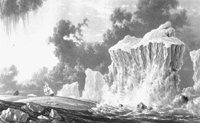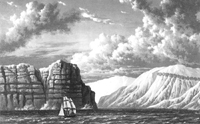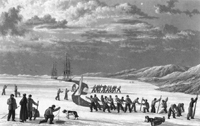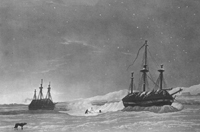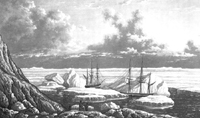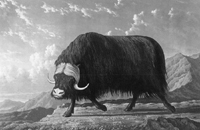|
Exhibition Links
|
Parry, William Edward, Sir, 1790-1855. [map
of Parry's expedition]
Journal of a Voyage for the Discovery of a North-West Passage from
the Atlantic to the Pacific: Performed in the Years 1819-20, in His Majesty's
Ships Hecla and Griper . . . . London, 1821. [Rare Books Division]
Almost immediately after Ross returned, the Lord Commissioners of the Admiralty planned follow-up expeditions: one by sea to further explore Lancaster Sound, the other over land and down the Coppermine River to the Arctic Sea. Parry, who had been Ross's subordinate on the previous expedition, was put in charge of the naval one. Two ships, Hecla (375-ton bomb vessel) and Griper (180-ton gun-brig), were commissioned, and both were strengthened in the same manner as those of Ross and furnished with provisions and stores for a period of two years. As an encouragement to the officers and seamen, the Admiralty agreed to double their ordinary pay. The expedition left England on 11 May 1819; Parry and his astronomer, Edward Sabine, reported back to London on 3 November 1820. The interval marked a period of extraordinarily successful exploration and achievement, not the least of which was that Parry
had the happiness of seeing every officer and man on board both ships, (with only one exception out of ninety-four persons), return to their native country in as robust health as when they left it, after an absence of nearly eighteen months, during which time we had been living entirely on our own resources. [Parry, p. 309.]
By 1 August 1819 they had reached the entrance to Lancaster Sound—not quite one year after Ross had observed there that his way west was blocked by the Croker Mountains. Parry and his crew proved they were fictitious by sailing through them, unimpeded by ice. In fact, the passage was remarkably clear of ice, and they continued to sail westward, naming everything in sight, most of which places would become significant in future Arctic expeditions and remain so-named today: Navy Board Inlet, Admiralty Inlet, Prince Leopold Island, Prince Regent Inlet, Cape Riley and Beechey Island, Wellington Channel, Barrow Strait, Cornwallis Island, Cape Walker, Bathurst Island, Byam Martin Island, Melville Island.
At a quarter-past nine P.M. [September 4], we had the satisfaction of crossing the meridian of 110° west from Greenwich . . . by which His Majesty's ships, under my orders, became entitled to the sum of five thousand pounds, being the reward offered by the King's order in council, grounded on a late Act of Parliament, to such of His Majesty's subjects as might succeed in penetrating thus far to the westward within the Arctic Circle. [Parry, p. 72.]
They proceeded westward but severe ice halted their progress, and so they retreated to a safe harbor on Melville Island, which Parry named Winter Harbor, where they would be iced in for over ten months. This was the first British naval expedition of the nineteenth-century to winter in Arctic conditions: its activities and precautions became a model for future ones. There were musical and theatrical entertainments, school classes, hunting parties, meteorological and magnetic observations, overland exploration, and even a weekly journal, The North Georgia Gazette and Winter Chronicle. The winter was severely cold—the mean temperature in February 1820 was 32 below zero (in Fahrenheit)— but wolf-skin blankets kept the men warm in their bunks. However, there were cases of frostbite requiring the amputation of fingers and toes, appearances of scurvy, and one death.
In May the crews were able to cut the ships out of the ice, and they finally escaped from the island on 1 August 1820. They resumed their push west but encountered the impenetrable pack-ice of the Arctic Ocean, having reached a farthest west longitude of 113° 46'43.5". On August 26, Parry, with support from his officers, decided to turn east and explore southern passages to the American continent. In less than a week they had reached Prince Regent Inlet.
Having now traced the ice the whole way from the longitude of 114° to that of 90° without discovering any opening to encourage a hope of penetrating it to the southward, I could not entertain the slightest doubt, that there no longer remained a possibility of effecting our object with the present resources of the Expedition; and that it was, therefore, my duty to return to England . . . [Parry, p. 266.]
Rations, which had been on two-thirds allowance for ten or eleven months, were accordingly increased. After leaving Lancaster Sound, Parry progressed down the western coast of Baffin Island, intent on surveying it closely. Stopped by ice around latitude 68°, they were forced to head away from land before sailing for home. In summarizing his thoughts about a Northwest Passage, which Parry firmly believed in, he made several suggestions: navigating along a continuity of land, which could offer occasional supplies of wood, game, and anti-scorbutic plants, would be preferable; a lower latitude (69° instead of 75° ) would offer a more favorable climate and a longer navigable season; westerly and north-westerly winds helped clear shores of ice and brought clear weather, and so a traverse from west to east might be more successful and faster (he used his own example of covering the distance from Winter Harbor to the entrance of Lancaster Sound in six days, while it required five weeks to go in the opposite direction). Whatever the commercial advantages might be in solving the geographical question, Parry encouraged British whalers to take advantage of the fisheries discovered by Ross's expedition of 1818.
